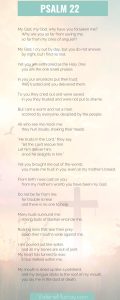
The Bible says Jesus was tempted in every way we are. Does this mean he was also tempted to fear?
“For we do not have a high priest who is unable to empathize with our weaknesses, but we have one who has been tempted in every way, just as we are—yet he did not sin” (Hebrews 4:15).
Jesus is fully God and fully human (Colossians 2:9, John 1:14, 1 Timothy 2:5).
Honestly, I’ve always struggled to picture Jesus as fully human. I wonder if any of you have, too? It’s hard for me to conceptualize the humanity of Jesus because it feels like taking away some of Christ’s perfection, strength, and power.
But the humanity of Jesus never makes him sinful or weak!
It wasn’t until I allowed myself to embrace the humanity of Jesus that I understood the compassion behind Jesus’ command, “Do not be afraid.”
If we can simultaneously embrace our Savior’s divinity and humanity, we’ll be able to see the depth of God’s love for us.
As I read scripture and walk with Jesus into the Garden of Gethsemane, I listen to him pray as he falls to his knees before the Father and pleads with God to “take this cup from me.”
Jesus was not asking to be released from the purpose for which he had come, but for there to be a way to fulfill his purpose and also avoid the suffering he was about to face (The Moody Bible Commentary p. 1595).
Still, Jesus expressed his submission to God, “Yet not my will, but yours be done” (Luke 22:42). “My Father, if it is not possible for this cup to be taken away unless I drink it, may Your will be done” (Matthew 26:42). Jesus prayed this same prayer three times (Matthew 26:44)!
Luke was a doctor, and his account of Jesus’s anguish describes a rare medical condition called “hematohidrosis.”
“And being in anguish, he prayed more earnestly, and his sweat was like drops of blood falling to the ground.” (Luke 22:44 NIV)
Sweating blood is a rare medical condition called “hematohidrosis.” Under extreme stress or anxiety, the blood vessels constrict and rupture, causing blood to go into the sweat glands. It makes sense that Luke, who was a doctor, would note this condition.
Jesus was about to experience something none of us will have to endure. Not only would he bear the weight of every person’s sin, but he would be separated from the Father. This disconnection was completely foreign to him, as he had been with the Father since before Creation.
In his flesh, Jesus was tempted to run away in fear. But he didn’t run! He stayed. He battled temptation with fervent prayer to the point of sweating blood.
Jesus wanted his disciples to stay awake and pray with him—“my soul is overwhelmed with sorrow to the point of death. Stay here and keep watch with me” (Matthew 26:38). He told them to pray because “the spirit is willing, but the flesh is weak” (Matthew 26:41).
Jesus understands the weakness of our flesh because he battled with it also.

The spiritual warfare that took place in the garden of Gethsemane, between Satan tempting Jesus to cower in fear and the power of the Holy Spirit defeating the fear of death, represents the same spiritual battle we encounter on earth. We can claim victory because Jesus already achieved it for us. He already paid the price and won the battle!
The scene is introduced in my NIV Bible with the subtitle: Jesus Agonizes in the Garden.
The place where Jesus prayed is called “The Mount of Olives” and means “olive press” and symbolizes the fate of Jesus as prophesied in Isaiah:
“But he was pierced for our transgressions, he was crushed for our iniquities; the punishment that brought us peace was on him, and by his wounds, we are healed” (Isaiah 53:5).
Jesus was crushed physically, mentally, and spiritually for the world.
I cannot read the account of Jesus’ crucifixion and ignore Jesus’s emotions and the fear he must have felt.
Watching the Passion of Christ again this year, I noticed a tear fall down Christ’s cheek as the high priest Caiaphas mocked Jesus and spit on him.
“Jesus was afraid,” I said out loud to my family—confirming my belief that you can have faith and be afraid at the same time. His tear didn’t represent weakness but compassion, strength, forbearance, mercy, and courage.
I think it’s difficult to grasp the humanity of Jesus and the emotions he felt because we have never experienced emotion without the influence of our sinful nature.
Jesus felt emotion without sinning. He never had sinful thoughts that led to emotions inappropriate for his situation. His emotions never lead to sinful behavior.
God sent his Son Jesus to earth in order to relate to human suffering and pain and to save us from the kind of fear that makes us want to run away from God. Share on X“He was despised and rejected by mankind, a man of suffering, and familiar with pain. Like one from whom people hide their faces, he was despised, and we held him in low esteem” (Isaiah 53:3).
“Fixing our eyes on Jesus, the pioneer and perfecter of faith. For the joy set before him he endured the cross, scorning its shame, and sat down at the right hand of the throne of God” (Hebrews 12:2).
Jesus had courageous faith in facing what he feared. He endured the cross for us!
The definition of the word agony also shows that Jesus was afraid.
Agony is defined in Easton’s Bible Dictionary as:
“contest; wrestling; severe struggling with pain and suffering. Anguish is the reflection on evil that is already past, while agony is a struggle with evil at the time present. It is only used in the New Testament by Luke (Luke 22:44) to describe our Lord’s fearful struggle in Gethsemane.”
“ And being in an agony he prayed more earnestly: and his sweat was as it were great drops of blood falling down to the ground” (Luke 22:44).
The Bible tells us our sufferings will help us comfort others with the comfort we receive from Christ. Jesus knows and understands how suffering feels and comforts us in our pain (2 Corinthians 1:4). Just as Jesus turned to the Father for strength in suffering, we can too.
In the following verse, we see that our help for earthly fear is having Godly fear. Godly fear is the place where we find courage.
Godly fear enables us to walk in obedience to God, even when we are afraid. Share on X“Who, in the days of His flesh, when He had offered up prayers and supplications, with vehement cries and tears to Him who was able to save Him from death, and was heard because of His godly fear,though He was a Son, yet He learned obedience by the things which He suffered” (Hebrews 5:7-8 NKJV).
Jesus found courage in fearing God, and we can too!
Jesus found courage in fearing God, and we can too! Share on XJesus learned obedience when he moved forward in faith even when he was afraid, and we can too!
Another scripture that shows us that Jesus understands what it’s like to be afraid is Psalm 22.
Jesus quotes Psalm 22:1 as he is dying on the cross.
“My God, My God, why have you forsaken me?”
David writes Psalm (1-21) by the power of the Holy Spirit (Romans 8:9), and foretells the last words Jesus would utter on the cross. Psalm 22 is an expression of Jesus’ anguish on the cross.
A few years ago, I heard a pastor say to read Psalm 22 from the perspective of Jesus.
It was a defining moment for me because, for the first time, I felt like Jesus really knew what it was like to be afraid. And if he knows what it’s like to be afraid, then he knows what it’s like to be me. He understands why the struggle with fear is so hard.
Read Psalm 22 and think of Jesus’ death on the cross. I also created a free printout you can download below.
Psalm 22
My God, my God, why have you forsaken me?
Why are you so far from saving me,
so far from my cries of anguish?
My God, I cry out by day, but you do not answer,
by night, but I find no rest.
Yet you are enthroned as the Holy One;
you are the one Israel praises
In you our ancestors put their trust;
they trusted and you delivered them.
To you they cried out and were saved;
in you they trusted and were not put to shame.
But I am a worm and not a man,
scorned by everyone, despised by the people.
All who see me mock me;
they hurl insults, shaking their heads.
“He trusts in the Lord,” they say,
“let the Lord rescue him.
Let him deliver him,
since he delights in him.”
Yet you brought me out of the womb;
you made me trust in you, even at my mother’s breast.
From birth I was cast on you;
from my mother’s womb you have been my God.
Do not be far from me,
for trouble is near
and there is no one to help.
Many bulls surround me;
strong bulls of Bashan encircle me.
Roaring lions that tear their prey
open their mouths wide against me.
I am poured out like water,
and all my bones are out of joint.
My heart has turned to wax;
it has melted within me.
My mouth is dried up like a potsherd,
and my tongue sticks to the roof of my mouth;
you lay me in the dust of death.
Dogs surround me,
a pack of villains encircles me;
they pierce my hands and my feet.
All my bones are on display;
people stare and gloat over me.
They divide my clothes among them
and cast lots for my garment.
But you, Lord, do not be far from me.
You are my strength; come quickly to help me.
Deliver me from the sword,
my precious life from the power of the dogs.
Rescue me from the mouth of the lions;
save me from the horns of the wild oxen.
I will declare your name to my people;
in the assembly, I will praise you.
You who fear the Lord, praise him!
All you descendants of Jacob, honor him!
Revere him, all you descendants of Israel!
For he has not despised or scorned
the suffering of the afflicted one;
he has not hidden his face from him
but has listened to his cry for help.
From you comes the theme of my praise in the great assembly;
before those who fear you, I will fulfill my vows.
The poor will eat and be satisfied;
those who seek the Lord will praise him—
may your hearts live forever!
All the ends of the earth
will remember and turn to the Lord,
and all the families of the nations
will bow down before him,
for dominion belongs to the Lord
and he rules over the nations.
All the rich of the earth will feast and worship;
all who go down to the dust will kneel before him—
those who cannot keep themselves alive.
Posterity will serve him;
future generations will be told about the Lord.
They will proclaim his righteousness,
declaring to a people yet unborn:
He has done it!
The humanity of Jesus shows us how to have courage. He showed us what it was like to “do it afraid” and to “have faith over fear.” Jesus responded to the cross with courageous faith so that we can have courageous faith when facing our fears too.
How did Jesus respond?
“When I am afraid, I will trust in you” (Psalm 56:3).
Every time Jesus tells us not to fear or be afraid, he invites us to trust in Him.
I see the command, “Do not fear,” as an exhortation given out of complete understanding and love—because Jesus understands humanity. And Jesus understands what it’s like to be afraid.
I see the command, “Do not fear,” as an exhortation given out of complete understanding and love—because Jesus understands humanity. And Jesus understands what it’s like to be afraid. Share on XHe wants us to have faith that is vulnerable enough to feel emotion. Jesus didn’t hold back his emotions. Jesus voiced his feelings to God. Jesus prayed through them.
Because of Jesus, we can have faith that finds courage in what Christ has already accomplished for us. He battled the fear of death and defeated its power over us. “It is finished!”
“Since the children have flesh and blood, he too shared in their humanity so that by his death he might break the power of him who holds the power of death—that is, the devil—and free those who all their lives were held in slavery by their fear of death” (Hebrews 2:14-15, emphasis mine).
Fear doesn’t have to control us. Fear doesn’t have to rule our lives. We have been set free!
When Jesus tells us not to be afraid, it’s not because he thinks we will be able to wipe out the emotion of being afraid and stop it from ever occurring in our lives again. It’s because Jesus gave us reason not to be afraid and freed us from the fear of death by sharing in our humanity and becoming the perfect sacrifice.
When we are afraid, we can choose to respond as Jesus did. Jesus passionately prayed. Jesus didn’t let unpleasant emotions rule him. Jesus had Godly fear and wanted the Father’s will more than his own will.
Jesus understands we will be tempted to panic in fear instead of trusting him in fear, and so he guides us to live our lives on earth with an eternal mindset.
Jesus told the disciples they would face trials of many kinds, and he also told us we would have trouble in this world. We don’t have to fear because Jesus has an eternal plan to overcome all evil, sickness, and death.
Like Jesus, we can respond to fear by thinking of our life on earth with an eternal mindset.
“Therefore, we do not lose heart. Though outwardly we are wasting away, yet inwardly, we are being renewed day by day. For our light and momentary troubles are achieving for us an eternal glory that far outweighs them all. So we fix our eyes not on what is seen, but on what is unseen, since what is seen is temporary, but what is unseen is eternal” (2 Corinthians 4:16-18).
We don’t have to beat ourselves up when the troubles around us make us feel upset or scared. But we can look to Jesus and remember why he came to earth, lived a perfect life, died, and was resurrected. In doing so, he gave us the hope of heaven and the courage to face our fears even when we are afraid.
The same power that enabled Jesus to endure the cross, and the same power that rose Jesus from the dead, lives inside every believer through the gift of the Holy Spirit.
The humanity of Jesus shows us how to have courage. He showed us what it was like to “do it afraid” and to “have faith over fear.” Jesus responded to the cross with courageous faith so that we can have courageous faith when facing our fears too.
Stay tuned for the next post, 10 Ways Jesus Responded to Fear and We Can Too. I created a PDF of Psalm 22 and uploaded it to my free resource library. Subscribe to the Courageous Faith newsletter to have access to all the freebies. You’ll get an email with the password and link.
I am an Amazon Influencer and post daily product video reviews on my storefront. Check out my storefront and get daily updates on the latest Amazon finds! Subscribe to my YouTube channel ValPalreviews here!












 Hello there! I'm Valerie, a mom of four and wife of 27 years. My writing inspires others to cultivate courageous faith and find solace in trusting God, especially in moments of fear and uncertainty. Join me on this adventure as we explore the beauty of trusting God when we are afraid.
Hello there! I'm Valerie, a mom of four and wife of 27 years. My writing inspires others to cultivate courageous faith and find solace in trusting God, especially in moments of fear and uncertainty. Join me on this adventure as we explore the beauty of trusting God when we are afraid. 



